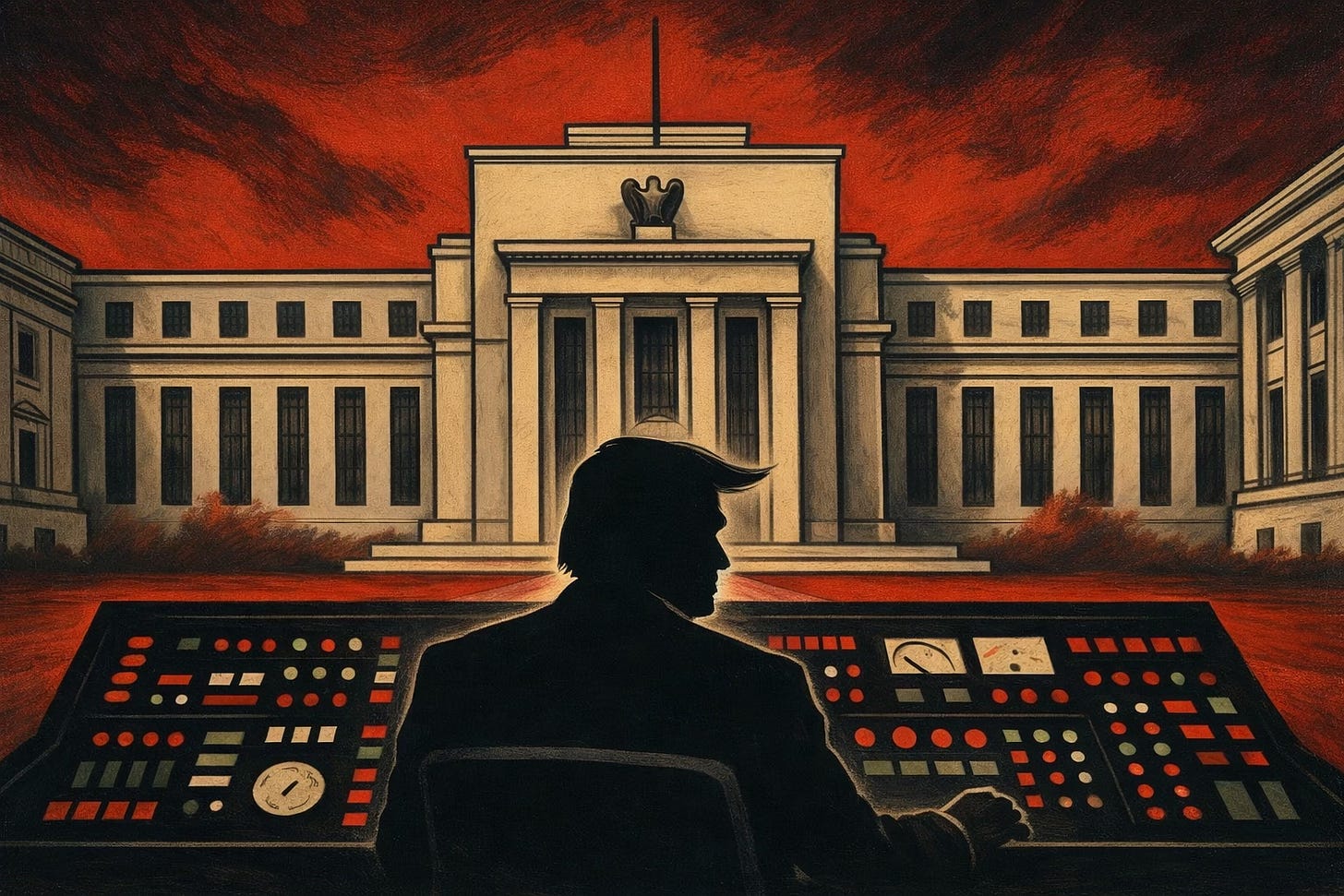Four Votes to Kill the Fed
Trump’s second-term plan for the Fed is anything but subtle.
The Fed’s independence feels like one of those things we’re all supposed to pretend still exists, like bipartisan cooperation or the idea that markets are rational.
But here’s what should keep everyone up at night: when Powell’s term ends, Trump appointees are gonna control the Federal Reserve Board. Not influence it. Control it.
The numbers tell a brutally simple story. Right now, there are two Trump appointees on the seven-member board: Michelle Bowman and Chris Waller. Come January 2026, Adriana Kugler’s term expires. That’s three. Then Powell’s chair term ends in May 2026, and despite his theoretical ability to stay until 2028 as a governor, the pressure campaign is already underway.
You’ve seen the headlines about the headquarters renovation scandal, right? That’s not about office furniture.
What happens with four Trump appointees on a seven-member board? Well, that’s where things get genuinely terrifying.
The 2019 DOJ opinion that nobody seems to be talking about essentially says the Board can fire regional Fed presidents at will. Not for cause. At will. These aren’t protected positions like the governors themselves. They’re what the lawyers call Inferior Officers, which sounds like something out of a dystopian novel but is actually just legal terminology that might reshape American monetary policy for a generation.
Think about what this means. The New York Fed president, who has a permanent vote on the FOMC, could be dismissed with a letter. The hawkish presidents who’ve been pushing back against premature rate cuts? Gone. Replaced with whoever the White House wants.
But dismissal threats are just the beginning. The Board also controls the budgets of regional Fed banks. Remember DOGE and their slash-and-burn approach to federal agencies?
Imagine:
The Chicago Fed wants to publish a paper on inflation risks? Sorry, budget cuts.
The San Francisco Fed raises concerns about financial stability? We’ll need to review your operational expenses.
There’s this persistent belief floating around that the system will somehow protect us. That Fed governors are data-driven people who won’t bend to political pressure. You hear people saying things like they won’t lower rates or the board requires 12 votes to get a new chair. And maybe that’s true for the current Trump appointees. Waller and Bowman have been pretty conventional. But that was first-term Trump, when he still had people whispering in his ear about institutional norms.
This is second-term Trump. The Trump who’s already floating Fed renovation controversies as potential cause for dismissal. The Trump whose Treasury Secretary is publicly saying Powell should step down to avoid market confusion.
Here’s what really gets everyone: people keep comparing this to court-packing or other historical precedents, but we’re in uncharted territory. The Fed’s independence isn’t enshrined in the Constitution. It’s a norm, a tradition, a general understanding that monetary policy shouldn’t be subject to electoral cycles. But norms are just social conventions until they’re not.
And the timing… God, the timing. We’re potentially heading into this shift right as inflation proves stickier than anyone wants to admit. If we don’t see consistent improvement, the pressure to cut rates will be overwhelming. A Trump-controlled Fed Board won’t need to fire anyone if they can just outvote them.
Trump probably doesn’t even want to implement some elaborate monetary theory. This isn’t about Austrian economics or MMT or any particular ideology. He just wants lower rates. He wants to refinance. He wants to be able to say he brought rates down. It’s that simple and that dangerous.
The crazy part is Trump’s already denying he appointed Powell, saying Biden did it. Flipping the Fed to sycophantic control will diminish the dual mandate and adversely impact the economy. He’ll probably blame Biden for that too.
Powell’s caught in an impossible position. If he stays on as governor after his chair term ends, he’s a lame duck watching his institution get hollowed out. If he leaves, he hands Trump the majority even sooner. Either way, by mid-2026, the transformation will be complete.
Maybe this is alarmist. Maybe the Senate confirmation process will provide some guardrails. Maybe the bond market will enforce discipline where political institutions fail. But watching everyone treat this as just another Trump controversy that’ll blow over… it feels like we’re sleepwalking into a fundamental restructuring of American monetary policy.
You know what? Maybe those June meeting minutes really were unanimous because everyone genuinely agreed on the data. Maybe institutional culture is stronger than political pressure. Maybe this time really is different.


